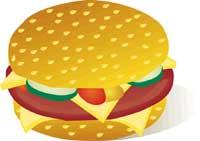URA: heart of food
As we have already studied in previous sections, our body asks us to provide food to meet energy needs. The body needs several ingredients that you will find in the food in different sizes. The composition of food is quite variable and each element will have a certain function. Thus, energy foods, which contain carbohydrates, fats and proteins, and non-caloric, but which contain vitamins and mineral fats that facilitate the normal development of the chemical reactions that occur in the body.

Regardless of the distribution of the ingredients, water predominates in all foods. According to some researchers, water cannot be considered a component of food, but its importance in our life is not questioned by anyone. The human body has between 50-60% water and in the case of newborns the proportion is higher, between 70-75%. Without water, therefore, there is no life.
Water is the main motor of many functions: it helps the functions that are given in the cell structure; it carries elements in blood, sweat, linfa and/or urine; it is responsible for the maintenance of the body temperature; it has a lubricating function between the membranes of the pleura; it participates in the intestinal mobility; and finally in the formation of saliva.
How much water do we need to properly perform all these functions? Obviously, it is not possible to legislate with a general nature; when calculating our water needs, we must take into account the amount of water we eject and that, of course, depends on many factors (remember that water is removed by urine, sweat or breathing). Once this calculation is done, we consume one milliliter per kilocalorie for the body to function properly, which means 2,400 kcal. if you need them 2.400 ml. You must drink water).
So much? We cannot forget that water consumption is not exclusive to the water we drink, but we must also take into account the water content of food to balance it. For example, the water content of the vegetables is very high, around 95-90%, but in the cereals the percentage of water is of the order of 5 10%. However, and without forgetting the circumstances that occur at every moment, we should drink a liter and a half of water a day.
- Cancer and Food What we eat is also directly related to cancer. The one who has reached this conclusion is a team of researchers who work in the study of eating habits and have already made known the first results of these investigations. Abusive consumption of animal fats can cause bladder, breast, and prostate cancer. In the future, it will be an important line of research to find bridges between nutrition and cancer, since, at the same time as food that can cause the onset of cancer will be better known, food that can prevent cancer will also be better known.
- Salt of life and pepper Salt is one of the ingredients of our diet. Fine salt or coarse salt are options when preparing any meal. Be careful! Salt causes the expulsion of calcium, so an unnoticed lack of calcium can occur. It will be necessary to pay special attention to women with menopause or who have just passed away, since as is known, osteoporosis has a direct relationship with calcium and therefore salt will not benefit at all.





